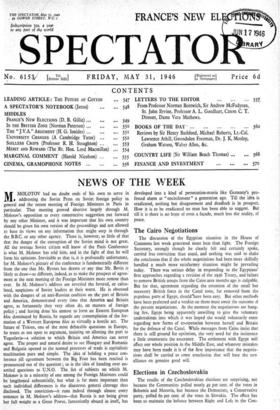The Cairo Negotiations
The discussion of the Egyptian situation in the House of Commons last week generated more heat than light. The Foreign Secretary, strongly though he clearly felt and certainly spoke, carried less conviction than usual, and nothing was said to shake the conclusion that if the whole negotiations had been more skilfully handled a much more satisfactory situation might be prevailing today. There was serious delay in responding to the Egyptians' first approaches regarding a revision of the 1936 Treaty, and failure to remove British troops from the Cairo area months ago is culpable. But for that, agreement regarding the retention of the small but necessary British force in the Canal zone, far removed from the populous parts of Egypt, should have been easy. But other methods have been preferred and a verdict on them must await the outcome of the present negotiations. At the moment the negotiations are hang- ing fire, Egypt being apparently unwilling to give the voluntary undertakings into which it was hoped she would voluntarily enter regarding new forms of co-operation between herself and Britain for the defence of the Canal. While messages from Cairo insist that there is still ground for optimism, the very need for the insistence a little counteracts the assurance. The settlement with Egypt will affect our whole position in the Middle East, and whatever mistakes may have been made it is of the first importance that the negotia- tions shall he carried to some conclusion that will base the new alliance on genuine good will.






























